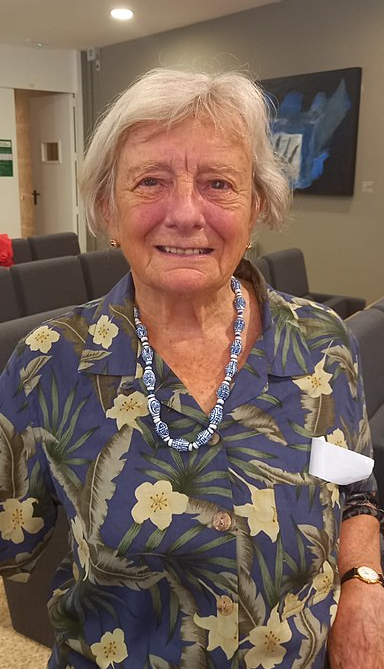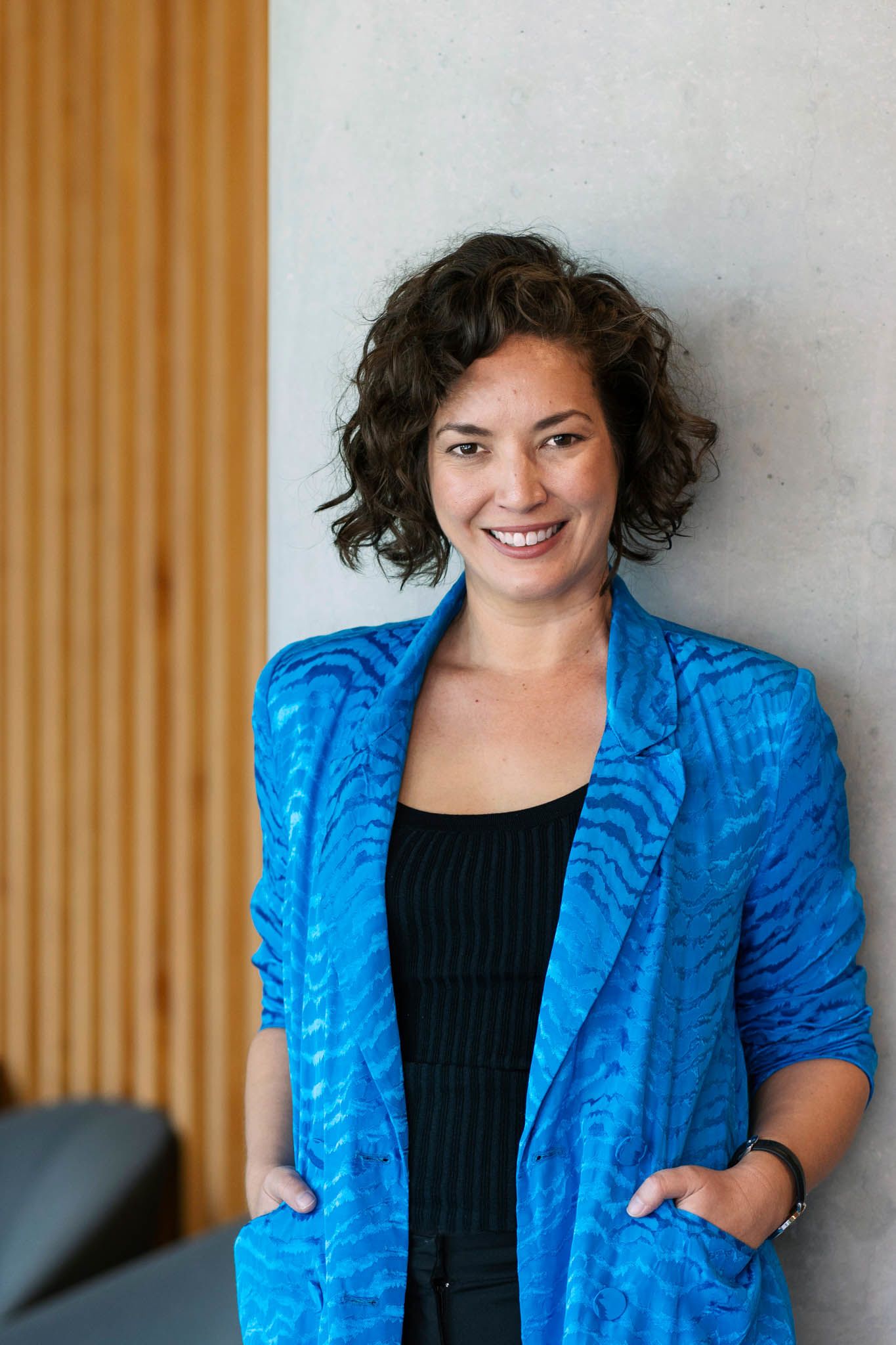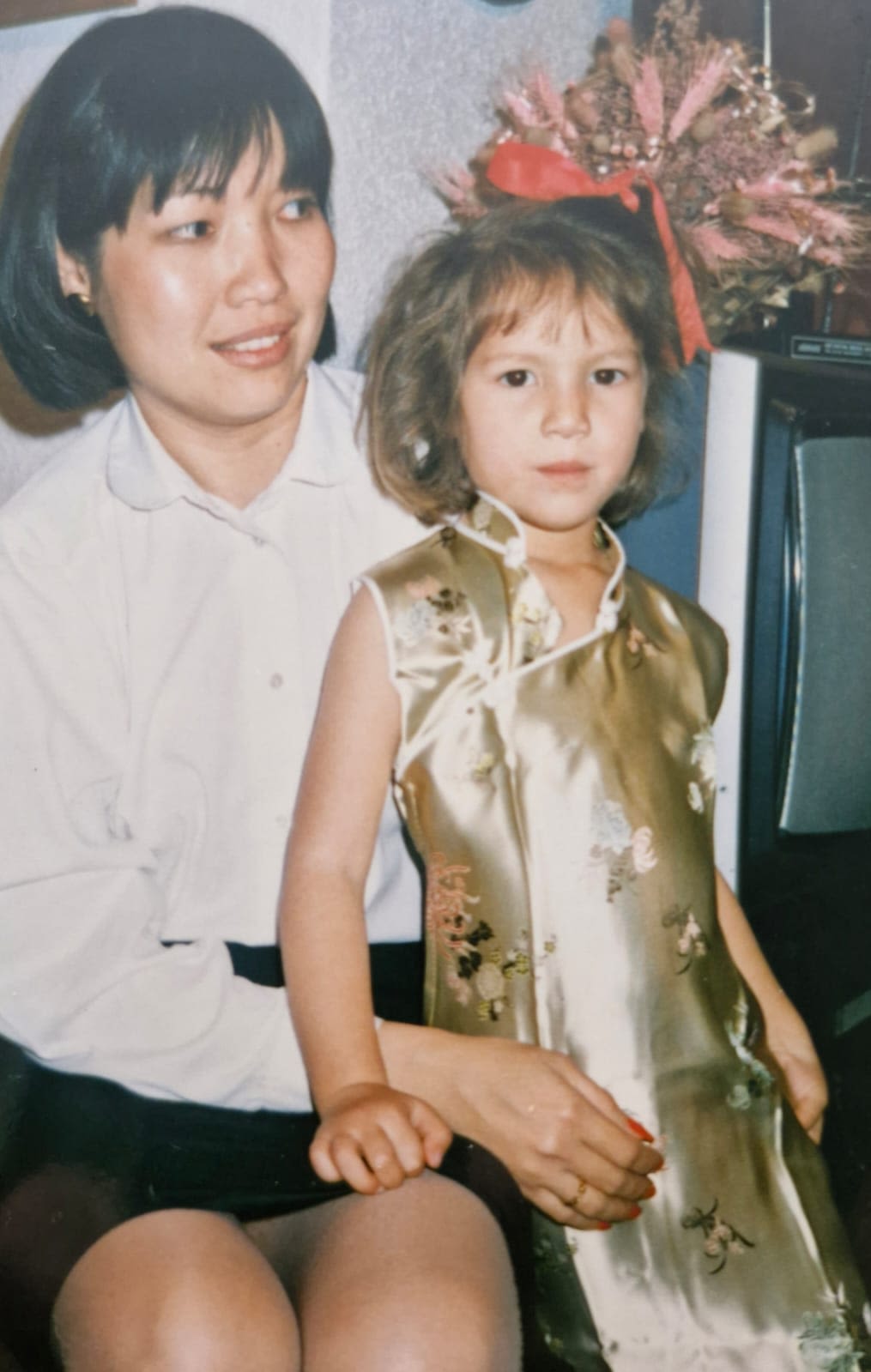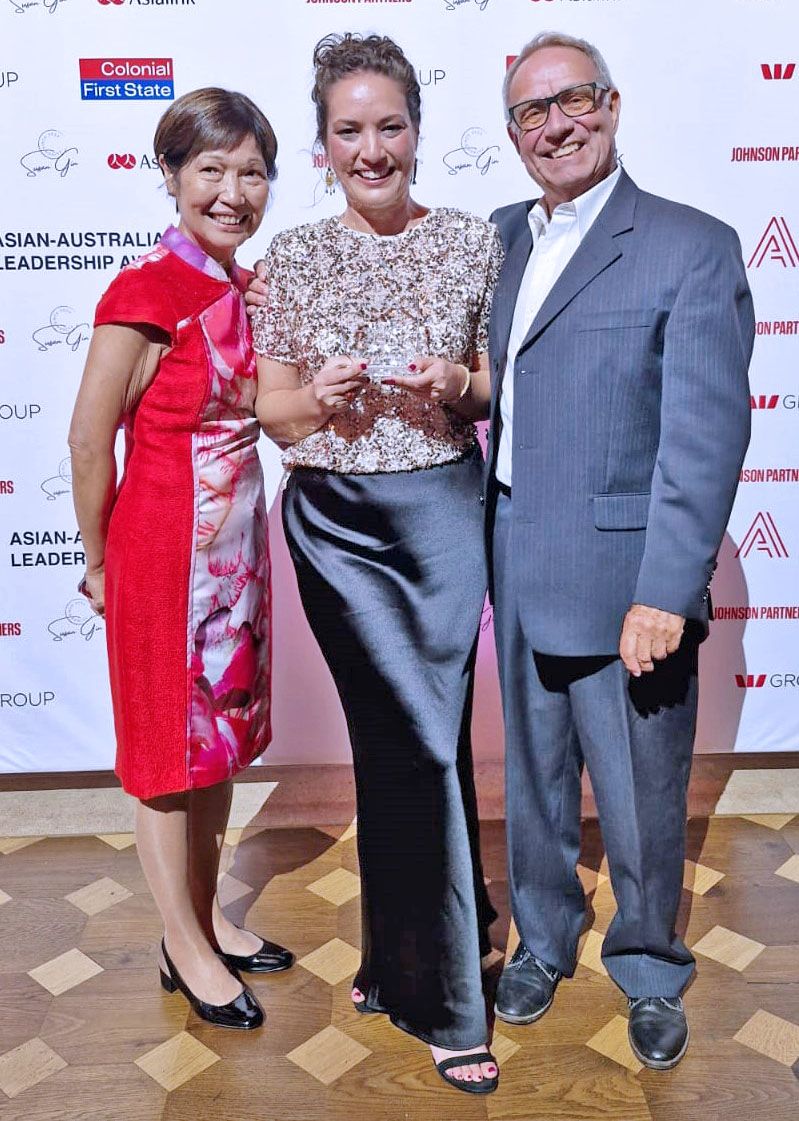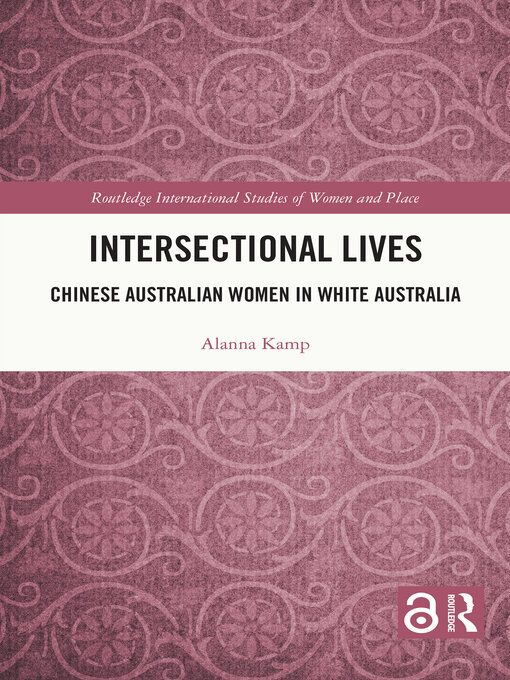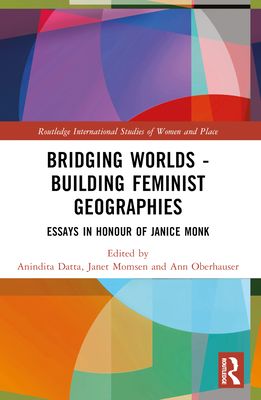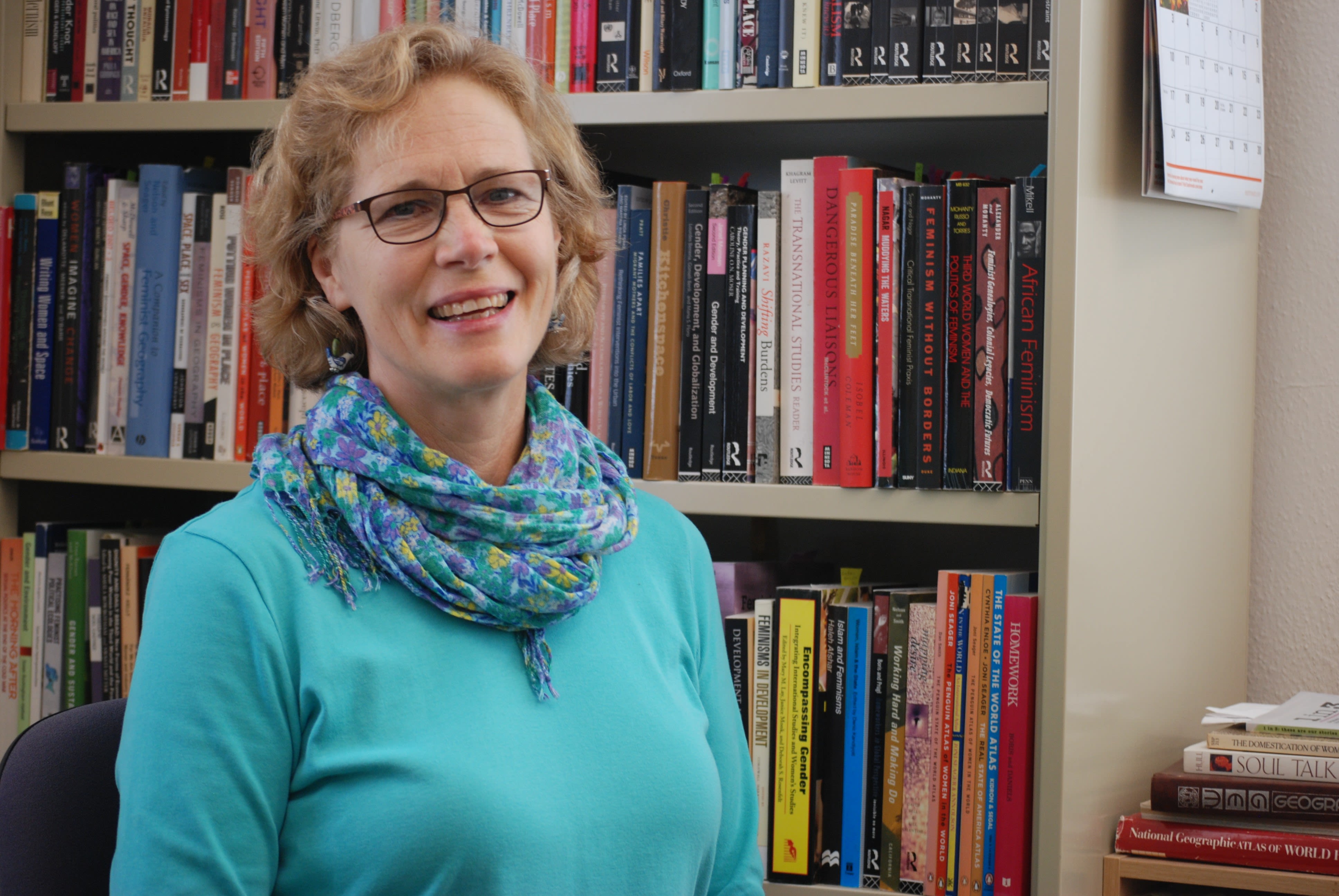Knowing one's place
Bringing untold stories to light in "The Routledge International Studies of Women and Place Series"
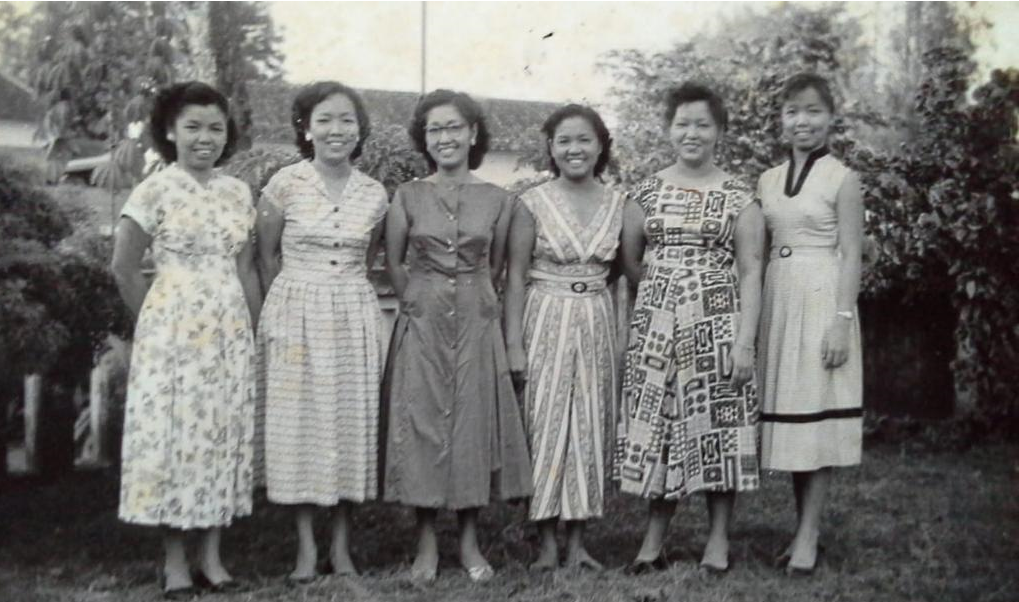
Dr. Janet Momsen, Editor, "Routledge International Series of Women and Place", Emerita Professor of Geography at the University of California, Davis.
Dr. Janet Momsen, Editor, "Routledge International Series of Women and Place", Emerita Professor of Geography at the University of California, Davis.
Dr. Alanna Kamp, Senior Lecturer in Social and Cultural Geography, Western Sydney University, Author "Intersectional Lives: Chinese Australian Women in White Australia"
Dr. Alanna Kamp, Senior Lecturer in Social and Cultural Geography, Western Sydney University, Author "Intersectional Lives: Chinese Australian Women in White Australia"
A young Alanna Kamp and her mother.
A young Alanna Kamp and her mother.
Alanna Kamp (middle) with her mum and dad. Alanna won the 2024 Asian Australian Leadership Award in the category "Community, Advocacy & Not for Profit"
Alanna Kamp (middle) with her mum and dad. Alanna won the 2024 Asian Australian Leadership Award in the category "Community, Advocacy & Not for Profit"
The phrase “The personal is political” was coined around 1969 to describe an awareness that women’s everyday lives – and the unique experiences of women ranging from health care to housework – were significant enough to be political (i.e., not private) issues. Many of us may take this idea for granted now, but it was truly a watershed moment, where, for the very first time, regular peoples’ lived experiences came to the forefront to be considered as relevant to the examination of both current events and policy, as well as central to the telling of history. It launched a revolution in thinking, which led to the evolution of new types of scholarship focused on women and marginalized groups.
The Routledge International Studies of Women and Place Series is a landmark book series that was founded by current editor, the award-winning Emerita Professor of Geography at the University of California, Davis, Dr. Janet Momsen, and feminist geography pioneer Dr. Janice Jones Monk, who sadly passed away July, 12, 2024. Monk, an Emeritus Professor at the University of Arizona School of Geography, Development and Environment, wrote over 100 journal articles, received numerous awards, and was known to be “passionate about supporting women and communities that have been historically marginalized.”
We got to sit down and discuss two recent books in the series with some of the editors and authors. Dr. Alanna Kamp, author of “Intersectional Lives: Chinese Australian Women in White Australia”, shared stories from her life and her book, and editors Dr. Anindita Datta, Dr. Ann M. Oberhauser, and series founder Dr. Janet Momsen explained why they decided to do a festschrift (a collection of writings published in honor of a scholar) for Janice Monk with “Bridging Worlds - Building Feminist Geographies: Essays in Honour of Janice Monk.”
We hope to pay tribute to Janice Monk’s memory in this blog article, and are proud to help Janet Momsen continue Monk's legacy with this important series.
Giving women their rightful place in history
In 1991 Janet Momsen and Janice Monk launched the series “The Routledge International Studies of Women and Place.” We had the chance to speak with Janet Momsen, and she shared anecdotes about how the series originally came together. Momsen explained that they were encouraged by colleagues at Routledge to consider a series on this specific topic, and as Momsen says: “The series grew rapidly as we were one of the first to publish on women and on gender issues.”
It is a testament to how far the world has come that originally Momsen and Monk had wanted to use the term gender, but editors warned that "gender would not be understood by booksellers.”
Momsen continues: “I asked Jan (Janice Monk) to co-edit with me. I felt that in this way we covered the European, American, Canadian, and Australian markets. At first it was a great deal of work as we had to find contributors and review manuscripts and even proofread and correct them. This work was much reduced when Faye Leerink (Taylor & Francis) became editor and began to work on discovering contributors.”
“Jan and I, along with Maria Dolors García Ramón of the University of Barcelona, started the International Geographical Union (IGU) Women and Geography Study Group in 1992 after I organized the first conference at Newcastle University (UK) in April 1989. The Group became a fully fledged Commission of the IGU in 1996 and has grown steadily ever since as interest in geography and gender has expanded. This has of course provided both authors and readership for the series.”
“This series is one of the oldest and most respected in the field of gender and social studies broadly interpreted. It now attracts new contributors on a regular basis since it is so well known in the field.”
The Routledge International Studies of Women and Place series advances our understanding of the diversity and complexity of women's experience around the world, working across different geographies to explore the processes which underlie the construction of gender and the life-worlds of women.
Over 20 years of scholarship
The first book published in the series was “Different Places, Different Voices: Gender and Development in Africa, Asia and Latin America”; edited by Momsen and Vivian Kinnaird, this book was praised as “plot(ting) the terrain of a feminist geography of gender and development.” Almost 21 years to the day later, Routledge published Alanna Kamp's “Intersectional Lives: Chinese Australian Women in White Australia.”
We had the pleasure of being able to discuss the book with Dr. Kamp. We asked her how she first became interested in the topic of Chinese Australian women, what are some of the stories that have inspired her, and why she feels that telling these stories is so important.
Surely there must have been women?
Alanna Kamp tells us how she began to uncover the hidden history of Chinese women in Australia. “I studied History at university and our final year project involved writing a ‘history of a week’. I researched a week in 1888 in which The Afghan, a ship carrying Chinese migrants bound for the goldfields of Australia attempted to land on Australian shores only to be turned away several times due to anti-Chinese protests and immigration restrictions in the colonies. Eventually, the ship was able to land in Sydney."
"The ‘Afghan Crisis’ is a pivotal moment in Australian history as it further fueled the desire to unite the Australian colonies under a Federated nation so that national immigration restrictions could be implemented. While doing the research for this assignment, I found that none of the history books, parliamentary debates, newspaper reports and other primary sources of the time mentioned Chinese women. When we think of the goldfields and Chinese miners, we always think of Chinese men. I thought – surely there must have been some Chinese women who also arrived in Australia, or who were born here as descendants of these early migrants.”
While doing the research for this assignment, I found that none of the history books, parliamentary debates, newspaper reports and other primary sources of the time mentioned Chinese women.
Making the invisible visible
Kamp continues: “I did my Honour’s year in Human Geography, focusing my thesis on the parliamentary debates of 1901 (the year of Australia’s Federation) in which the Ministers of Parliament debated the introduction of the Immigration Restriction Act. The Act was passed, and provided the cornerstone of the White Australia Policy which was to last all the way until 1973. Again, my research found very little mention of Chinese women—in the parliamentary debates themselves and the existing history books that document that period of Australian history.”
“This then led me to my PhD where I delved into the historical census and migration records and found thousands upon thousands of Chinese women – who either arrived in Australia during the White Australia Policy era or were born in Australia. These women had been erased from our collective understanding of this history and geography of migrant settlement. They were invisible. I was so intrigued and passionate to uncover who these women were, where did they settle, what were the challenges they faced, how did they thrive and contribute to the survival of their families and the development of their communities and the Australian nation. This was the crux of my PhD research – and my book 'Intersectional Lives' was born.”
My mum and dad, immigrants from Indonesia and Germany, met in Australia
Kamp explains her fascinating family history, and how it has impacted her work. “Many years after conducting this research I have also come to reflect on the deeply personal connection I have to this research. My mum is Chinese Indonesian (ethnically Chinese but stemming from many generations of migrants and descendants in Indonesia). In 1971, just 2 years before the White Australia Policy was formally abolished by the Whitlam Labour Government, my mum arrived in Australia from Indonesia at the age of 14 to attend boarding school on Wiradjuri country, in regional NSW. My grandparents sent her and her older brother, my uncle, to Australia as the Indonesian government at that time had a raft of anti-Chinese policies that included restrictions on educational opportunities for ethnically Chinese children. Mum was one of less than a handful of Asian students at her school, but she always talks fondly of her time there."
"One year before mum arrived, dad had arrived from Germany as an assisted migrant on the very last migrant ship to ever sail to Australia – The Australis. Landing at the docks at Woolloomooloo (Sydney) in 1970, he didn’t speak any English besides the broken lyrics of Rolling Stones and Beatles songs that he and his bandmates would cover back in the clubs in Germany. Growing up as a person with mixed heritage ancestry has always meant I’ve grappled with my identity and my place in Australia, and the world. I often struggle with a sense of belonging and inclusion as I don’t ‘fit’ clearly into specific cultural or ethnic groups, yet my connection to place is very strong. It is therefore no surprise that my investigations of Chinese Australian women’s lives in the White Australia Policy era follow similar themes – identity, belonging, migration and settlement histories, and connection to place.”
I often struggle with a sense of belonging and inclusion as I don’t ‘fit’ clearly into specific cultural or ethnic groups, yet my connection to place is very strong.
Digging under the surface
Kamp’s book is just as fascinating as her life story, and she highlighted for us the very first interview featured in the book, an interview which she says has stayed with her for the decade and a half since she conducted it. “All the nineteen women I interviewed for this book had amazingly interesting life stories and family histories. Many of the women led seemingly inconspicuous lives as school librarians, nurses, secretaries, workers in family businesses. But digging under the surface revealed complex experiences of migration and mobility, settlement, family relationships, gender roles, isolation, identity, maintenance of culture, belonging, sacrifice, bravery and resistance, and contribution to all facets of life. These were contributions to family life, community life, work and industry and even parliament! Helen Sham-Ho, who was interviewed and is included in the book was the first Chinese-born parliamentarian in Australia as a member of the New South Wales Legislative Council.”
Many of the women led seemingly inconspicuous lives ... But digging under the surface revealed complex experiences of migration and mobility, settlement, family relationships, gender roles, isolation, identity, maintenance of culture, belonging, sacrifice, bravery and resistance, and contribution to all facets of life.
"Her story has stayed with me"
“The book starts with the words of Stella Sun as her story has stayed with me throughout the decade and half since I interviewed her. Also, the one excerpt from the interview that opens the book encapsulates so many of the thematic intricacies I write about in later chapters. Stella’s maternal grandmother was sold as a child in China and via an arranged marriage came to Australia to be the concubine of a general merchant and pearl dealer on Thursday Island, a small island off the coast of far north Queensland that has a complex history of colonisation, trade, industry, and military use.”
“Stella’s mother was born in 1906 on Thursday Island, the first of nine children. Stella’s mother was sent to China to be married but soon became estranged from her husband. Stella was born in 1931 (therefore being second generation Australian) and was raised by her grandparents at their general store on Thursday Island. She told me stories of travelling back and forth between Thursday Island and the mainland due to WWII evacuations and the bullet holes left in the walls of her home by soldiers. At the age of 16, Stella managed one of her grandfather’s small stores. However, eager to leave the island, she moved to Sydney with the help of an editor of a local paper and the Young Women’s Christian Association. After working briefly as a news typist at the Sydney Morning Herald, Stella spent the rest of her working life at the Australian Broadcasting Corporation in administration, in the news department and news archives. Stella married her Chinese Australian husband when she was 21 years of age. They had three daughters and two sons. When I interviewed Stella she was so surprised that I found her life interesting. You can imagine my reaction! You’ll just have to read the book to find out more.”
Bridging Worlds - Building Feminist Geographies Essays in Honour of Janice Monk
Bridging Worlds - Building Feminist Geographies Essays in Honour of Janice Monk
Dr. Ann M. Oberhauser, Professor of Sociology at Iowa State University. Editor, "Bridging Worlds - Building Feminist Geographies Essays in Honour of Janice Monk"
Dr. Ann M. Oberhauser, Professor of Sociology at Iowa State University. Editor, "Bridging Worlds - Building Feminist Geographies Essays in Honour of Janice Monk"
Dr. Anindita Datta, Professor and Head of the Department at the Department of Geography, Delhi School of Economics, University of Delhi. Editor, "Bridging Worlds - Building Feminist Geographies Essays in Honour of Janice Monk"
Dr. Anindita Datta, Professor and Head of the Department at the Department of Geography, Delhi School of Economics, University of Delhi. Editor, "Bridging Worlds - Building Feminist Geographies Essays in Honour of Janice Monk"
Honoring a friend and colleague
In 2023, to honor the 30th anniversary of the International Geographical Commission on Gender and Geography, and the contributions of Janice Monk in establishing the field of feminist geography, "The Routledge International Studies of Women and Place" series editor Dr. Janet Momsen along with Dr. Anindita Datta and Dr. Ann M. Oberhauser brought together over 45 leading international scholars for their book “Bridging Worlds - Building Feminist Geographies: Essays in Honour of Janice Monk”. Featuring stories from all over the globe, the 21 chapters reflect the networks and themes Monk brought to life throughout her career, ranging from “the development of feminist geography in different global contexts, (to) gendered geographies of work and everyday life, and gender and environmental concerns.”
We spoke with the three women, and asked them to explain what Janice Monk meant to them, and to explain to people who may not be familiar with Monk's work why it is so important to honor her legacy.
Facing resistance on three fronts
In The Structure of Scientific Revolutions Thomas Kuhn wrote that "In science, novelty emerges only with difficulty, manifested by resistance, against a background provided by expectations." Series co-founder of "The Routledge International Studies of Women and Place" Janice Monk faced that resistance times three, as she pioneered new ways of thinking in her field, including scholarship with a focus on women and marginalized communities, and a multidisciplinary approach.
Jan’s most impactful legacy are the numerous colleagues and students she mentored and supported throughout the world. Truly a legend in her field, she bridged and connected different worlds.
Momsen, Datta, and Oberhauser explain the importance of Janice Monk’s scholarship: “Janice Monk’s amazing legacy in geography and gender studies is a tribute to her outstanding research, strong leadership, and generous mentoring of feminist scholars. Jan engaged in interdisciplinary research, challenging hegemonic and mainstream assumptions about gender, the discipline of geography, and marginalized communities."
They continue: "She worked tirelessly to build institutions based on equity and inclusion through her leadership at the Southwest Institute for Research on Women (SIROW), the American Association of Geographers (AAG), and the Gender Commission of the International Geographical Union (IGU). We greatly respect her ability to speak up and nurture a diverse international community of geographers. Jan’s most impactful legacy are the numerous colleagues and students she mentored and supported throughout the world. Truly a legend in her field, she bridged and connected different worlds.”
A festschrift
“Editing “Bridging Worlds, Building Feminist Geographies: Essays in Honour of Janice Monk,” a festschrift in honor of Janice Monk, gave us an opportunity to honor Jan while celebrating the tricenary of the IGU Commission on Gender and Geography and to recognize her leadership in co-founding the group in 1992. We (re)connected with colleagues across the globe who collaborated with Jan in research, geographic education, and community outreach or were impacted by her work. "The Routledge Series International Studies of Women and Place" (co-founded by Janet Momsen and Janice Monk) was an excellent venue to showcase this volume. Our list of potential authors seemed infinite as we delved into the scope and depth of her work across the globe!”
“Chapter topics range from Utu feminism in Africa and women in Brazilian geography to Indigenous communities in Australia. We realized that her legacy is the powerful network of feminist scholars she nurtured and the ways in which geographies of gender have expanded to claim space within mainstream geography. Her work is truly a ‘gift that keeps on giving’ throughout the world and across generations of feminist scholars and activists.”
If you are interested in publishing in the series, or would like to know more, please contact Commissioning Editor, Faye Leerink: faye.leerink@tandf.co.uk and Series Editor, Janet Momsen, jdmomsen@ucdavis.edu.
Contact Information and related links
Who to contact
For more information about publishing your research with us, click here for books or here for journals.
You might also be interested in:
- "On not excluding half of the human in human geography" from The Professional Geographer, 1982, Janice Monk and Susan Hanson
- "Janice Edith Jones Monk (13.03.1937 - 12.07.2024)" a tribute from Australian Geographer
- "The Janice Monk Lecture in Feminist Geography", Annually, Gender, Place and Culture
- Articles by Janice Monk published by Taylor & Francis
- "A life lived brightly: Wendy Martin and the founding of Women's Studies"
- "June Purvis and the herstory of Women's History Review"
- "Celebrating women who tell our stories"
- "Inspirational Women in STEM"
- "Women healers: from ancient female shamans to 21st-century doulas"
 China
China Africa
Africa

